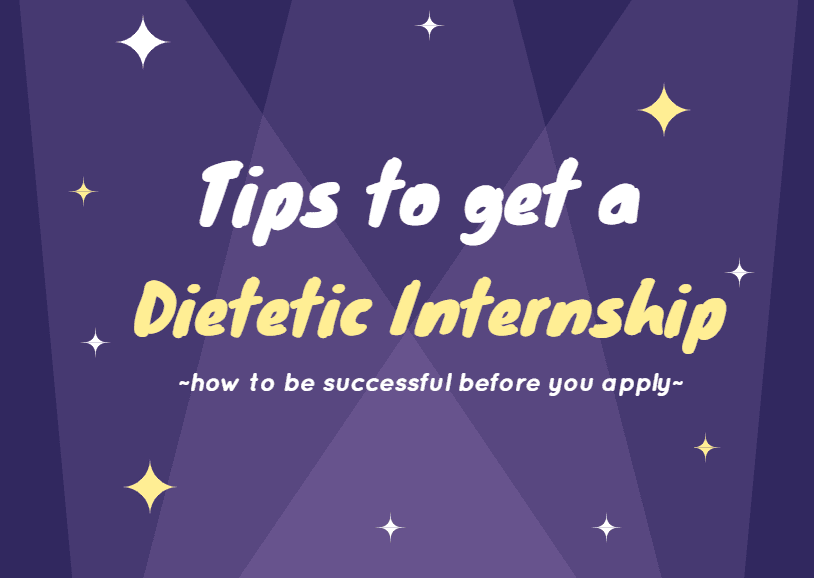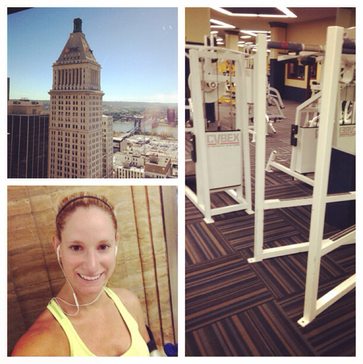
By: Courtney Rayppy
So….you wanna be a Dietitian one day do you? You love all things food related and your biggest dream is to inspire others to have a healthier, happier lives through nutrition education. You want other people to look up to you for inspiration and motivation. You want to teach others how nutrition can help prevent disease and improve their quality of life. If this sound likes something you are interested in or have had a passion for in the past, as a current Dietetic student all I can say is this: Go for it. Now, this may seem a bit easier said than done because I am sure you have heard the horror stories about how difficult it can be to get accepted into a Dietetic Internship program. But today I am sharing a few “life-saving” tips about what steps you should take if you are looking into pursuing a career in nutrition and dietetics.
What exactly is “dietetics?”
Dietetics is kind of the fancy term for professional nutrition education. The unfortunate thing about the world of nutrition is that there are many misconceptions about current diet and food studies. Plus the term “nutritionist” is often misinterpreted as an expert. To be considered a “nutritionist” you do not need a bachelors in nutrition or need take an accredited board exam but rather that you simply practice and study nutrition in a specific setting. For example, you can be a nutritionist if you work in a dynamic health setting and share nutrition education with others. Typically, one will take an exam online in which they can receive a certification to teach basic nutrition principles to others through an online course, much like personal training. It should be noted that a nutritionist, however, cannot provide Medical Nutrition Therapy like a Registered Dietitian.
Okay so, how do I become a Registered Dietitian???
After earning a bachelor’s degree in nutrition or dietetics, you will be required to apply for a Dietetic Internship program that is recognized as accredited. After you complete the internship, which is typically 7-12 months long, you are eligible to take the Dietetic Board Exam which costs $200 and can be taken any time after you complete the internship.
So…how do I get into an Internship?
Ah yes, this is the tricky part about this career path. Dietetic Internships are extremely competitive. When it comes to internships, program directors are looking for well-rounded individuals that have experience in areas of nutrition outside of their classes. During undergrad, it is advised to start volunteering with community nutrition programs, looking for a job in a nutrition related setting like a hospital kitchen or community food bank, and reaching out to local Dietitians to really get an idea what it is they do on a daily basis. Here’s my biggest piece of advice, get your feet wet! While volunteering and working in nutrition-related jobs is great for experience hours on your application (which is a huge) it is important to discover others areas and fields of nutrition.

Biggest Tips to be Successful before You Apply:
1. Get involved.
If you are passionate about nutrition and helping others live healthier lives, the best advice I have for you is to start getting involved now. This can be as simple as making your own nutrition related blog (something I started my freshman year as a nutrition student), becoming a club leader, or even creating your schools own nutrition club.
2. Be open to NEW experiences:
I am a firm believer in this because if I had not been open to trying new things in the world of nutrition I would most definitely not be where I am today. Not only does trying to experiences look great on your application, but it also allows for you to see what you like and what you don’t like in the nutrition field. For example, I thought I was going to end up in clinical because I was told that it was the “only option” to be successful as an RD. When I got my job in a local hospital delivering meals to patients, making trays depending on different clinical diets, and later working my way up being a Dietary Clerk working for the RD’s on staff- I realized that while I was very good at this position, it wasn’t where I truly felt I “belonged.” It was not until a volunteer opportunity opened up at a small agriculture farm where I fell in love with gardening and locally grown foods, as well as the consumption of them as a practice called “holistic nutrition.”
3. Focus on the only person who matters- YOU.
This degree is extremely competitive and throughout undergrad I can guarantee that there will be other students constantly bragging or talking about “all of the things” they’ve done and I know that it can be easy for you to let it get to your head or discourage you. Take a deep breath, and remember that it does not matter what other people are doing but rather what you are doing to immerse yourself in this degree and learn as much as you can about why you want to be an RD. For many people, that is usually the hardest question. Sure, every nutrition student wants to “help people eat healthier” or “prevent unwanted diseases” but what specifically makes you unique that will help you stand out above other applicants? As a personal assignment, sit down and just started writing down a list of ways you can contribute your passion for nutrition to other people. This can be a great tool that can help bring rise to new ideas you may not have considered.
4. Lastly, start researching and exploring internships now
On Eatrightpro.com you can see the wide variety of different options out there and which programs may the best fit for you! Each program is unique in its own way and each one will have different requirements and different qualifications for applicants.
I hope these tips and tricks will be useful for you as you begin to explore the world of nutrition and dietetics. My biggest piece of advice is to be open to exploring different fields related to nutrition to see where your passions might lie. If you love works with athletes, I highly recommend reaching out to an athletic coach or gym to talk to a nutrition expert. If you are interested in eating disorders, I would definitely reach out to a local facility and ask for a moment of their time to ask questions about the RD’s role and potential opportunities to shadow employees. I cannot express the importance of following your heart and putting yourself out there if you want to learn more about a given subject. You may get turned down ten times but it only takes one person to say yes to help to open up a new door for you in this career and starting paving the way.



